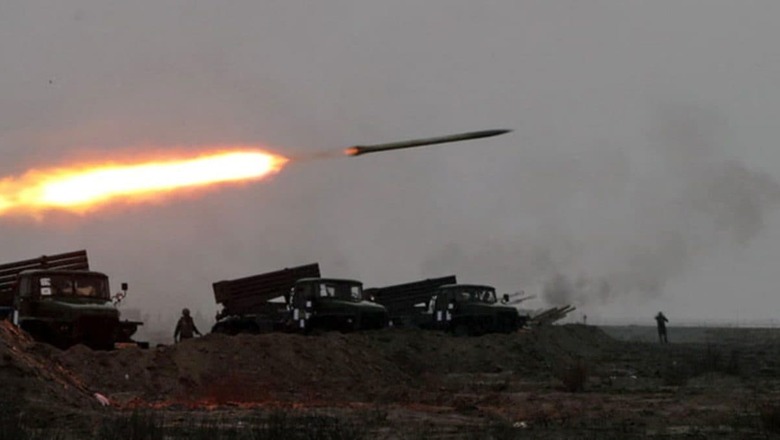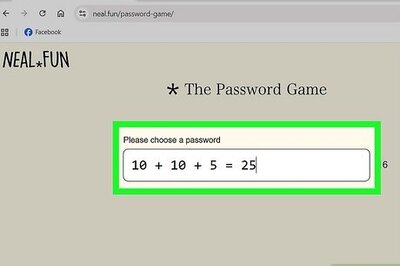
views
Tens of thousands of Iranians and a commander of Iran’s elite Revolutionary Guards, Major General Mohammad Ali Jafari, in 2019 urged former Iranian president Hassan Rouhani to give the Islamic Revolutionary Guard Corps (IRGC) more freedom to act against Pakistan for sheltering and harbouring separatist elements.
The Iranian armed forces officer was addressing a gathering which was mourning the 27 Revolutionary Guards killed in a suicide attack perpetrated by Jaish-al-Adl who Iran claims is backed by Pakistan, with support from Saudi Arabia.
“The government of Pakistan must pay the price of harbouring these terrorist groups and this price will undoubtedly be very high. The Islamic Republic of Iran will no longer observe the previous reservations and will directly act to counter such acts," Jafari told mourners gathered at the city of Isfahan’s Bozorgmehr Square, according to an AFP report.
At that time, Jafari blamed Pakistan’s army and Inter-Services Intelligence agency for sheltering the perpetrators.
Iran’s former president Hassan Rouhani even demanded Pakistan act “decisively against anti-Iranian terrorists" in a phone call with former Pakistani prime minister Imran Khan in 2019.
He said that Pakistan should not allow other nation’s with vested interests to spoil Iran-Pakistan relations, alluding to the United States and Israel, as well as Saudi Arabia and the United Arab Emirates, which it accuses of aiding jihadist groups responsible for attacks from Pakistani soil.
Five years later, the Iranian government led by Ebrahim Raisi appeared to have taken steps to reduce the group’s ability to conduct operations. Iranian media outlets reported that the nation’s armed forces destroyed the Pakistani headquarters of the jihadist group Jaish al-Adl in a series of missile strikes.
The Iranian government’s actions did not happen in a vacuum.
Prior to the strikes that targeted Pakistan’s Balochistan region on Tuesday night where Iran believes Jaish-al-Adl is based, the separatist group carried out two attacks in December 2023 and earlier this month targeting Iranian forces in Rask.
Two attacks on security forces in Rask, which is located in Sistan-Baluchistan province, led to the deaths of 12 policemen within one month. Throughout 2023, the Jaish-al-Adl and Iranian forces engaged in several confrontations which left at least eight Iranian police officers dead.
Who Are the Jaish-al-Adl
Iran did not expect the skirmishes between Jaish-al-Adl and Iranian forces to intensify after it executed Abdolmalek Rigi, in 2010. Rigi founded the militant group Jundallah, as per his claims, to fight for better rights for Sunni Muslims in Shiite Iran.
“The only thing we ask of the Iranian government is to be citizens. We want to have the same rights as the Iranian Shiite people. That’s it. We do not want discrimination between Sunnis and Shiites in this country. The Shiites are free to talk about their beliefs in public, to criticise and challenge the Sunni beliefs, by means of their books and the media. A Sunni, however, is not allowed to defend his beliefs, and to respond to the lies that the Shiites level against them on TV, in radio, in the press, and so on," Rigi told Al-Arabiya in an interview in 2008.
However, Iran claimed it had valid reasons to execute him. Jundallah carried out several attacks targeting Iranian forces and allegedly ambushed former president Mahmoud Ahmadinejad’s motorcade near Zabol, killing one of his bodyguards in 2005. They also carried out a bombing in Pishin killing around 40 people, including veteran commander Noor Ali Shooshtari.
The Jaish-al-Adl is one of many splinter organisations that emerged from Jundallah after Rigi was executed, according to the US Institute of Peace (USIP). The Iranian government recognizes it as the successor of Jundallah and alleged that Saudi Arabia and the US are key backers of the group, even though the US, Japan, and New Zealand, like Iran has labelled it a terrorist group.
The USIP report pointed out that Jaish-al-Adl appears to wield more power and influence than other organisations that broke out of Jundallah. It has taken on most of Jundallah’s tasks and functions, serving as the primary symbol of Baluch resistance in Iran.
Jaish-al-Adl – Tactics
Jaish-al-Adl’s logo is green in colour and displays the organisation’s name in Arabic and English. It features scales of justice hanging from an assault rifle and crossed sabres above a Quran. The group’s key leaders were Salahoodin Farooqi and Mullah Omar. The group has been also linked to al Qaeda cells in Pakistan and is known to support the Sunni opposition in Syria and Iranian Kurdish separatists. Jaish ul Adl conducts cross-border raids between Iran and Pakistan and uses Pakistani territory as a rear base for activities in Iran.
The group claimed responsibility and announced its formation by conducting attacks in October 2013, April 2015, and April 2017 which resulted in the deaths of Iranian border guards.
Unlike other Baloch insurgent groups, the Jaish ul Adl actively shares its operations on YouTube. In the videos shared it was seen that its fighters often don’t retreat and instead close in on Iranian government forces while attacking them.
Tehran and Islamabad frequently accuse each other of allowing militants to operate from the other’s territory to launch attacks, but it is rare that official forces on either side engage.
(with inputs from USIP blogs, IRNA, AP and AFP)


















Comments
0 comment